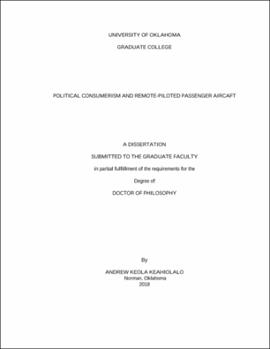| dc.description.abstract | The overall purpose of this study was to determine if there exists a receptive market for a new aviation passenger model that by use of emerging technologies may significantly decrease the threat in air safety that is pilot fatigue. In this study, that technology has been termed remote piloted aircraft (RPA). For this technology to be fielded successfully, the following must be available: 1) primary and supporting technologies, 2) corporate investment, 3) professional operators, 4) consumer support, 5) regulatory apparatus. This writing details how currently the aviation industry is secure in the first three. It then describes an experiment performed to determine how the fourth, consumer support for RPA, may be cultivated. The major hypothesis was that by informing consumers of the capabilities of RPA technology, they would be more apt to support it when compared to consumers that were not so informed. An anonymous online survey was distributed to US based aviation consumers. Respondents were divided into three groups: a treatment group that was presented with information about RPA capabilities, a placebo control group that was presented with information about aviation excluding RPA capabilities, and a full control group that was given no information. All respondents were queried regarding their likelihood to travel on a flight using RPA in three different conditions in which RPA might be fielded. By way of one-way ANOVA and appropriate multiple comparisons calculations, it was determined that the treatment group showed a significantly greater level of support for RPA travel than either the placebo control or full control group. This pattern was consistent in all three conditions in which RPA fielding was presented (Cond1, F(2, 213) = 24.81, p < .001; Cond2, F(2, 213) = 6.8, p = .01; and Cond3, F(2, 213) = 4.59, p = .01). | en_US |
